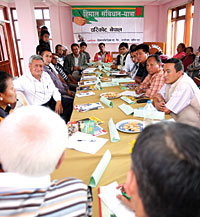Himalkhabar Patrika organised a discussion on the model of federalism in Charikot two weeks ago. People from diverse backgrounds participated in the discussion. Translated excerpts:
What should the structure of federalism be? 
Kiran Lama (NC): The demand put forth by ethnic communities is that there be ethnic and regional autonomy with right to self- determination. But provinces should be created not only on the basis of ethnicity but also on the political rights of other non-ethnic groups.
Nara Bahadur Pakhrin (RPP): Without education and wealth, ethnic minorities won't succeed and will probably have to surrender leadership of their provinces to well-educated higher castes. The Maoists have encouraged ethnic pride, but in the absence of education this will probably only promote ethnic discrimination. An ethnic federal system won't bring development overnight.
Shankar Lama(Maoists): The rights of all communities living in any particular ethnic province should be guaranteed. This does not mean non-ethnic groups can never come into power. It is not enough that the federal units are inclusive. They should be given autonomy. Federal units should be created considering ethnicity, gender, religion and class.
Krishna Basnet (Gaurishankar Multiple Campus Chief): The purpose of federalism should be to unite people and discourage secession. We should also study experiences with federalism throughout the world. These experiences teach us that provinces should be owned by all their inhabitants and not just ethnic groups.
Gopal Neupane (UML): What is important is to lift up backward communities, which requires an equal distribution of opportunities and human and natural resources, not ethnic federalism. One group should not suffer in the name of uplifting another. All communities should get equal respect and be
represented in all sectors.
What if the federal units are based on and named after particular ethnicities?
Tanka Jirel (social worker): The people do not care about the names of the provinces, they are more concerned with what work is done. The government should help ethnic minority groups, for instance when an SLC graduate cannot pursue higher education due to financial instability at home. How does the name of a state help a minority?
All they want are a few facilities, to stop travelling miles to reach a clinic or the district headquarters to receive their citizenship. The marginalised ask for nothing more than these minor privileges.
Kumar Bishwakarma (Dalit rights activist): Fourteen per cent of the population of Dolakha is Tamang. If it becomes a Tamsaling province, this minority will be ruling the rest, which is unfair. Provinces should be based on economic as well as social factors.
Norsang Sherpa (Federal Democratic Sherpa Association): The Maoist-proposed ethnic federal system won't be inclusive of every ethnic group and class. They're considering making an autonomous Sherpa province, which will help me individually, but still won't be inclusive of every group. So, instead of breaking up the country into ethnic provinces, I propose a regional division, with an autonomous Himalayan region.
Parbathi Khadka (Maiti Forum): We need to help women, and think about how to lift them out of poverty and denigration. Also, federalism should be based on geography and not ethnicity. That way we can name our provinces after geographical landmarks, like Gauri Shankar, instead of ethnicities, like Tamsaling.
Whipping it up
Abhishek Pratap Sah, MJF CA member, Kapilbastu
How did you spend the last year in the CA? 
It didn't go as well as I'd expected. Political instability interrupted the constitution-writing process. We've fallen behind the schedule we fixed ourselves, which means we probably won't complete the constitution on time, not unless we put aside our differences.
What needs to be done to finish on time?
First, we have to run the committees in a more orderly fashion. The constitutional committee has stopped functioning. It is leaderless, which has stalled the sub-committees too. The big leaders have to devote themselves totally to the constitution instead of fighting their petty wars. If the constitution isn't written on time, it could invite more trouble.
Has your party used its whip in the committee meetings?
Not so far.
But the party whip must hold some influence in these meetings?
Some pressure is inevitable. Those committee members who were nominated via the proportional representation system, particularly, won't agree to anything without the party's green signal. But those who have been directly elected listen to their own conscience and aren't scared of their party bosses.
What's the country's main problem right now?
Corruption, and all young leaders should be aware of it. It takes Rs 500,000-600,000 to build a culvert in the village. If a politician were involved, the cost would skyrocket to Rs 2,500,000-3,000,000. Youth leaders need to do something
about this.
"Maoists slowing things down"
Usha Gurung, NC CA member, Jhapa
How has the past year been? 
During the first couple of months, I felt like I was lost at sea. It's taken me a while to find out what my responsibilities are. I didn't know most of the other 600 CA members, and I still don't. The big parties have been fighting each other, which means we probably won't meet the constitution deadline.
What needs to be done?
The parties must find common ground. If they cooperate, it won't be difficult. If some are stubborn, we can still rely on a two-third CA majority to render them irrelevant. The party whips must stop operating at all levels of government. If all this happens, we can finish the constitution in the remaining eight months.
Have you faced pressure from your party whip?
No.
But surely others have?
The Maoist members all parrot their party whip. This is a major reason why so many of the committees are behind schedule. The Maoists are slowing things down.
Will the CA schedule be revised a fifth time?
If the big parties don't reconcile, the schedule will be pushed back again. They need to stop seeking out new issues to disagree about and mend their differences.


